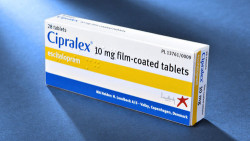Cipralex (escitalopram) Coupons, Discounts & Cost
Cipralex (escitalopram) is an antidepressant that belongs to the class of selective serotonin reuptake inhibitors (SSRIs). One way to save money on the Cipralex (escitalopram) retail cost regardless of income and insurance status is to use Cipralex (escitalopram) coupons or discount cards from RXCoupons. Use this Cipralex (escitalopram) coupon at this online pharmacy and receive up to 75% off the sale price.
Cipralex (escitalopram) general information
Cipralex (escitalopram) is an antidepressant that belongs to the class of selective serotonin reuptake inhibitors (SSRIs). It is used for treatment of depression and panic attacks. The active substance is escitalopram. The drug significantly reduces the symptoms of neuropsychiatric disorders.
Cipralex (escitalopram) main indications for use
Cipralex (escitalopram) effectively treats the following conditions: depressive episodes of any severity, panic disorders with or without agoraphobia (fear of open spaces), social disorders, generalized anxiety disorder, obsessive-compulsive disorder.
Cipralex (escitalopram) contraindications
The following contraindications are present: hypersensitivity to the active substance (escitalopram), therapy with MAO inhibitors, pregnancy, lactation, age up to 15 years.
Treatment with Cipralex is contraindicated during pregnancy and lactation.
Cipralex (escitalopram) possible side effects
Mild side effects usually occur during the first week of therapy. Patients may experience the following side effects: Digestive system: nausea, diarrhea, loss of appetite, constipation, vomiting, dry mouth. Nervous system: dizziness, insomnia or drowsiness, visual disturbances, tremor, seizures, disorders of motor activity, hallucinations, confusion, mania, serotonin syndrome, agitation, anxiety, panic attacks. Reproductive system: sexual apathy, ejaculation disorders, impotence, anorgasmia. Circulatory system: orthostatic hypotension. Endocrine system: galactorrhea. Other side effects: anaphylactic reaction, skin rash, pruritus, ecchymosis, arthralgia, myalgia, urinary retention. These symptoms are usually mild and go away fairly quickly. Withdrawal symptoms may include nausea, dizziness, headache. Overdose symptoms may include dizziness, agitation, tremors, drowsiness, seizures, arrhythmia, vomiting, metabolic acidosis, rhabdomyolysis, hypokalemia.
Cipralex (escitalopram) method of use and dosage
Cipralex (escitalopram) tablets are taken regardless of food intake, preferably in the morning. The tablets should be taken whole, without being chewed or crushed. Duration of therapy is determined by the type of the disease and the patient’s tolerability.
In case of depressive episodes, the therapeutic dose is 10-20 mg per day. The antidepressant effect of the drug develops within 2-4 weeks. Cipralex treatment should be continued for at least 6 months.
In case of panic disorders, the following regimen is recommended: first week of treatment - 5 mg. After that, the dose may be increased to 10 mg. The maximum daily dosage is 20 mg. The therapeutic effect develops within 3 months. Cipralex treatment should be continued for several months.
In case of social phobia, the therapeutic dose is 10 mg per day. If the drug is well tolerated, the dose may be increased to 20 mg per day. The effect of the drug develops within 2-4 weeks. Cipralex treatment should be continued for 3-6 months.
In case of generalized anxiety disorder, the therapeutic dose is 10-20 mg per day. The duration of treatment is 3-6 months.
In case of obsessive-compulsive disorder, the therapeutic dose is 10-20 mg per day. Cipralex treatment should be continued for at least six months.
The recommended daily dosage for elderly patients is 5-10 mg. Patients with kidney disease and liver disorders (mild to moderate) may not change the dose.
It is necessary to reduce the dosage gradually in order to avoid severe withdrawal syndrome.
Cipralex (escitalopram) interaction with other drugs
MAO inhibitors and serotonergic drugs increase the risk of serotonin syndrome.
Cipralex increases the effect of drugs that reduce blood clotting. The drug increases desipramine and metoprolol levels.
Cipralex (escitalopram) warnings
Patients suffering from panic disorder may have suicidal thoughts during the first two weeks of treatment. Start taking the drug at low doses and increase gradually. If the symptoms do not disappear, immediately inform your doctor.
People suffering from diabetes should increase the dose of insulin while taking Cipralex.

